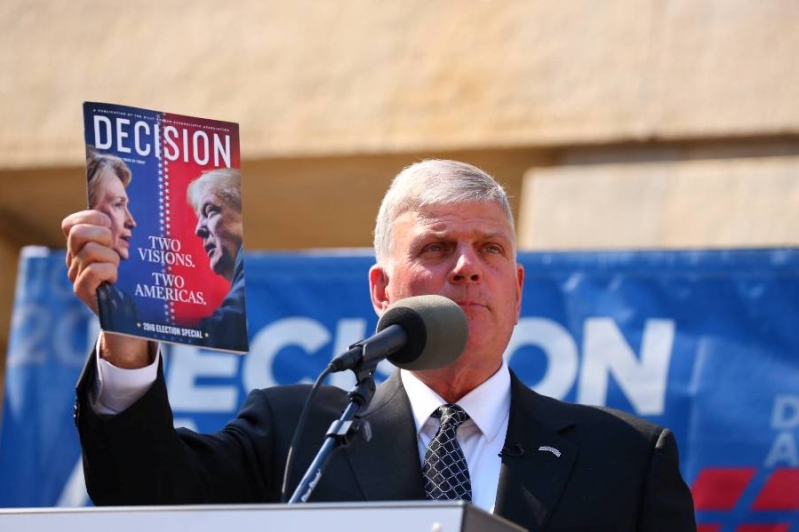
After coming under fire for supporting Donald Trump's controversial refugee ban, Franklin Graham has explained that while he believes Christians should care for the poor and needy, the president's job is "not the same as the job of the church".
In a lengthy Facebook post shared on Tuesday morning, Graham, the leader of the humanitarian organization Samaritan's Purse, said that President Trump is simply protecting the Constitution and the safety of Americans by signing an executive order suspending the admission of refugees from seven countries to the US for the next couple months.
"Taking action to secure our borders had to start somewhere," he said. "Is it perfect? Maybe not, but it is a first step. As they work on solutions during this 90-day travel ban, unfortunately there are some innocent families caught in this time of transition."
Graham took his argument a step further, arguing that the vetting process needs to apply to people coming into the U.S. from all countries-not just seven.
"We have to be sure that the philosophies of those entering our country are compatible with our Constitution," he said. "If a person does not agree with our principles of freedom, democracy, and liberty, which we cherish, they should not be allowed to come. Without question, Sharia law is not compatible."
Billy Graham's son went on to hit back at a number of critics who slammed him for supporting the ban, arguing that the president's job is not the same as the job of the church.
"As Christians we are clearly taught in the Bible to care for the poor and oppressed," he said, pointing out that Samaritan's Purse has provided aid to those in the Middle East for over three decades and recently opened a field trauma hospital in Iraq to help Muslims persecuted by other Muslims.
"As Christians we are commanded to help all, regardless of religious background or ethnicity, like the Good Samaritan Jesus shared about in the Bible," he said. "Our job is to show God's love and compassion. I believe the best way to help is to reach out and help these people in their own countries."
Graham went on to say he supports the establishment of "safe zones" inside Syria and Iraq that would be protected by the international community until a political solution is found.
"We need to pray for political solutions that would bring peace and allow them to return to their homes as they desire," he concluded.
The executive order, part of Trump's campaign promise to crackdown on immigration, targets seven Muslim-majority countries: Syria, Iraq, Somalia, Iran, Sudan, Libya, and Yemen.
Graham first came under fire last week when he said he has no problem with Trump's Muslim ban because it's "not a Bible issue."
He told the Huffington Post: "We want to love people, we want to be kind to people, we want to be considerate, but we have a country, and a country should have order and there are laws that relate to immigration and I think we should follow those laws. Because of the dangers we see today in this world, we need to be very careful."
The order has drawn mixed responses from evangelical and conservative leaders, with some praising the President for his commitment to protecting the US, but a few others denouncing the ban as "troubling" and "anti-Biblical".
On Monday, Russell Moore, president of the Ethics & Religious Liberty Commission of the Southern Baptist Convention, wrote a letter to Trump stating: "We are deeply concerned that the order will cause widespread diplomatic fallout with the Muslim world, putting Southern Baptists serving in these countries in grave danger and preventing them from serving refugees and others who are in need with humanitarian assistance and the love of the gospel," he continues.
He added, "There are some very dangerous people in the world today, especially coming out of the Middle East. We need to be very careful."
According to a Pew survey, about two-thirds of white evangelicals (67%) and mainline Protestants (65%) believe that America does not have a moral responsibility to accept Syrian refugees. Overall, 40 percent of American voters agreed.







